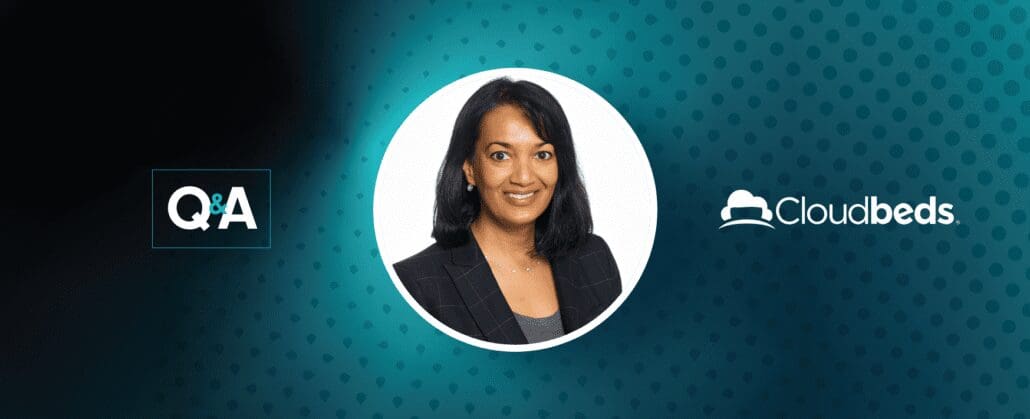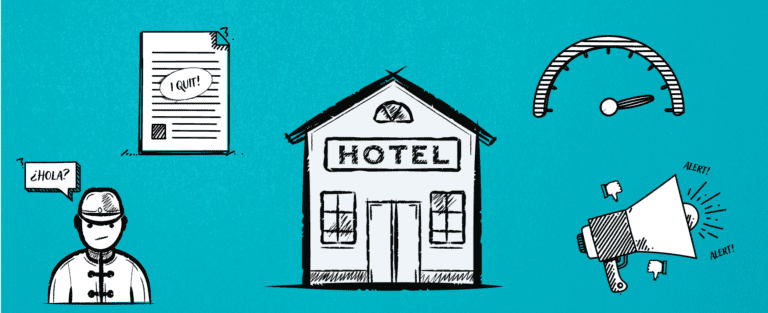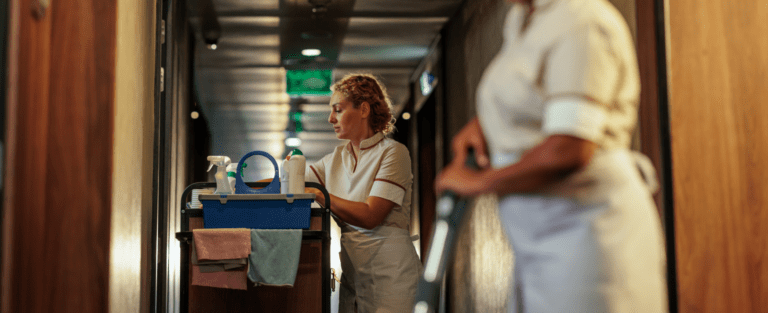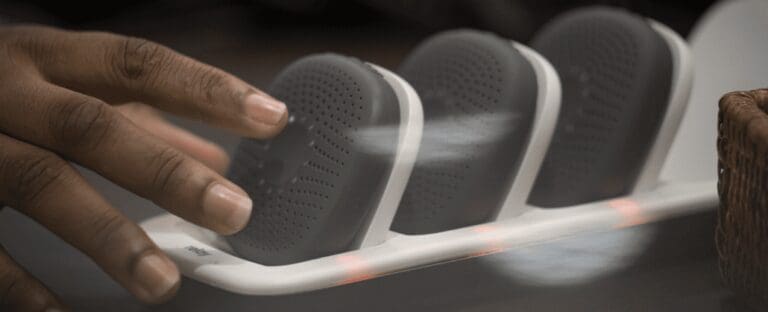Q&A with Janet Jaiswal, VP of Global Marketing at Cloudbeds,
Does it ever feel as though digital transformation in the hospitality industry moves at warp speed? That’s because technology innovation really has sped up drastically in the past months.
Last fall McKinsey & Company released a survey with information on how COVID-19 brought about accelerated digitization of customer and supply chain interactions. The executives polled revealed that things really are moving faster than before with shares of “digital or digitally enabled products in their portfolios has accelerated by a shocking seven years.” Beyond investing in digital stocks, there is more of an actual investment in digital products to improve the quality of one’s professional life, most especially in the hospitality industry.
Based on all the innovations shared at HITEC 2021, It would seem as though hotels are at the forefront of the newest tech revolution. But not all hotels, casinos, and resorts are keeping up with the emerging technologies. Unfortunately, that means many hospitality-related businesses are missing out on the tools that could help transform their hospitality-related businesses.
We asked Janet Jaiswal, VP of Global Marketing at Cloudbeds, a cloud-based integrated platform for the hospitality industry, for some of her insights into how to channel the newest technologies. She offered tips to improve everything from bookings to customer service to your bottom line.
Digital technology trends accelerated by the pandemic
After nearly two really tough years, the hotel industry is seeing encouraging signs of recovery. But it’s also a bewildering time in figuring out how to implement and use new technology. “Properties can no longer run at full capacity without tools like self-service and automation,” Jaiswal said. She added that “More and more travelers are becoming comfortable with digital technology trends accelerated by the pandemic, such as keyless door locks and self-serve room check-in and check-out.”
HOTELS MUST EMBRACE DIGITAL TRANSFORMATION TO ATTRACT THEIR GUESTS AND PROVIDE THEM WITH UNIQUE AND DIFFERENTIATING EXPERIENCES.
Jaiswal mentioned the resurgence of spending on travel. “Millennials are increasingly traveling. Today, they represent 31.5% of the world’s population, spending more than $550 million a year in the US alone. They are undoubtedly the new modern travelers setting the expectations of our industry.” Which has a direct impact on how hotels must pivot to embrace these travelers. According to Jaiswal, “The confluence of these trends means that hotels must embrace digital transformation to attract their guests and provide them with unique and differentiating experiences.”
But those transformations aren’t necessarily cosmetic or trendy. “The biggest mistake that hoteliers can make is thinking that SmartTVs or in-room tablets are enough to satisfy the modern traveler,” Jaiswal said. Instead, “it’s about providing a 360° digital experience in offers, reservations, room access, guest communications, payments, and much more.” The question that hoteliers should be asking is, “What can we do to make every touchpoint of the guest experience more convenient and more seamless?”
Minor technology upgrades with major impact
You might be surprised to find out that not only do some hotels lag behind when it comes to technology, but some still rely on pen, paper, and handwritten notes for important admin tasks. “Technology has been a great equalizer in many industries, and the hotel industry is no exception. It levels the playing field for smaller hotels with the larger, more established hotel chains,” Jaiswal said. Though it’s not always the case. “Unfortunately, many small hotels today still manage their property using old-fashioned pen and paper or a basic spreadsheet in many parts of the world.”
While it can be intimidating to consider setting up or upgrading your technology, it doesn’t have to cost a fortune. Relay panic buttons offer a state-of-the-art solution that’s also affordable. So if setting up associate alert devices is a priority for your hotel, you can probably check it off your list sooner than anticipated.
At Relay, we’re proud that our devices connect distanced workers and empower them through the use of a panic button and a completely connected cellular network. Contact us to find out how to empower your staff and clientele through connectivity with a device that alerts anyone to potential danger.
As for the rest of the tech you really need, Jaiswal said “investing in technologies does not always require a large budget and hiring an IT professional. There are many ways to make minor technology upgrades to a hotel that can drive significant ROI.” One of the first steps might be to make up a wish list, a budget, and a timeline to help figure out how to take those next steps.
Start with your website
Jaiswal reminds us that nearly 150 million travel bookings are made online each year. Is your property well equipped to capture those online bookings? “Having a well-optimized website and a mobile-friendly booking engine is a huge first step in making sure travelers can both find and book your property online,” Jaiswal said. “Best of all, it’s one of the hotel’s most profitable channels.”
Implement a channel manager
It’s entirely possible that despite your best efforts you’re missing potential income. Jaiswal said to consider other channels where you might be selling rooms. “Many small properties often rely on selling on a single channel, such as Booking.com or Airbnb, because it can be time-consuming to manage inventory and room rates across multiple channels. Having a simple tool called a channel manager allows you to connect your property’s inventory and availability across multiple channels, so you only have to manage rates in one place.”
If you’re unfamiliar with channel managers, they’re a technology that allows hotels to offer online listings across multiple booking sites, apps, and more. Managing rooms and rates is easily managed as well. Hoteltechreport.com compiled a list of the ten best channel managers for hotels to manage everything from booking to room inventory.
Consider an integrated payment solution
Jaiswal said adding an integrated payments solution can make all the difference when it comes to saving your staff time and headaches. “Accepting credit card payments can be a huge hassle when it comes time to reconcile your books — which payment belongs to which guest?” She recommends the newer integrated payments solutions which not only automate this process to save you hours of manual work. “They also offer convenient ways for the guest to pay, such as contactless and mobile e-wallet payments, which ultimately enhances the guest experience.”
Keep it simple
When a hotel operates more efficiently, guests take notice. And it isn’t always the overpriced technology upgrades that improve their experience. The simple technologies mentioned above “vastly improve the lives of both hoteliers and their guests, and they don’t require huge upfront investments,” Jaiswal said.
Newer cloud-based SaaS platforms like Cloudbeds are able to offer properties access to these tools for modest monthly subscription or transaction fees, allowing a hotelier to start small and expand from there.
And it might seem like a no-brainer, but make sure your staff is trained in all the new protocols and systems.




